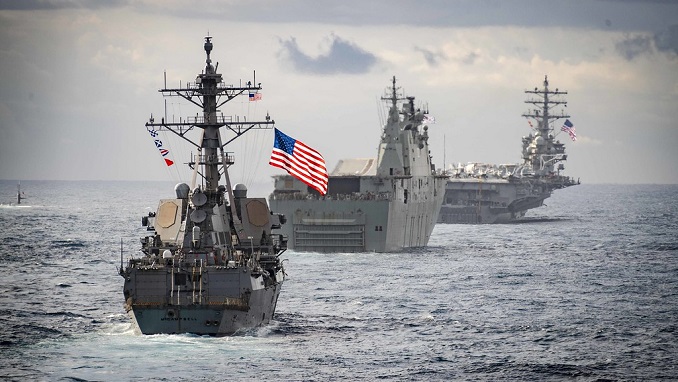The Pentagon has warned that U.S. maritime forces will become more forceful in responding to acts of aggression, expansionism, and breaches of international law, citing Beijing in particular, which has been criticized for expansionist ambitions in the South China Sea.
A major new report signed by the heads of the U.S. Marine Corps, Navy, and Coast Guard warned the “rules-based international order is once again under assault”, and the security environment had dramatically changed since 2015.
The report said China and Russia were now “determined rivals” of the U.S., with China presenting “the most pressing long-term strategic threat”.
“China is the only rival with the combined economic and military potential to present a long term, comprehensive challenge to the U.S.,” the report said.
“It seeks to corrode international maritime governance, deny access to traditional logistical hubs, inhibit freedom of the seas, control use of key chokepoints, deter our engagement in regional disputes, and displace the United States as the preferred partner in countries around the world.”
China is in the midst of a rapid modernization and expansion of its military power. Its naval force is the world’s largest, more than tripling in size over the past two decades. It has embarked on aggressive expansionism in the South and East China Seas with frequent military drills, and in the Taiwan Strait with near daily incursions into Taipei’s air defense identification zone. In response the U.S. has increased its naval activity in the region and enacted sanctions against China.
“Our globally deployed naval forces interact with Chinese and Russian warships and aircraft daily,” the document said, noting their “growing aggressiveness” and calling China “the most pressing, long-term strategic threat.”
The latest incident between the U.S. and China naval forces took place in late August, when Beijing said it had driven an American warship from the disputed Paracel archipelago.
Beijing claims almost all of the islands of the South China Sea, territorial claims disputed by other countries in the region including Vietnam, Malaysia, the Philippines and Brunei.
To counter China, the U.S. has been sending ships to the region more frequently to carry out what it calls “freedom of navigation” operations.
The Pentagon report predicted that in the event of a conflict, both China and Russia would likely attempt to seize territory before the U.S. and its allies could effectively respond.
To maintain strategic advantage over the Chinese navy, the U.S. plans to modernize its naval force with smaller, more agile and even remotely piloted ships.
U.S. ships will also “accept calculated tactical risks and adopt a more assertive posture in our day-to-day operations,” the statement said.
The report accused Russia and China of employing all instruments of power to undermine the international system and remake it in their own interests, in part by incrementally conducting “a variety of malign activities” to not trigger a military response.
